-
 Bitcoin
Bitcoin $115000
0.12% -
 Ethereum
Ethereum $3701
4.50% -
 XRP
XRP $3.081
2.99% -
 Tether USDt
Tether USDt $0.0000
-0.01% -
 BNB
BNB $767.9
1.45% -
 Solana
Solana $169.5
3.13% -
 USDC
USDC $0.9999
0.01% -
 Dogecoin
Dogecoin $0.2106
4.30% -
 TRON
TRON $0.3334
1.62% -
 Cardano
Cardano $0.7564
2.54% -
 Stellar
Stellar $0.4165
0.76% -
 Hyperliquid
Hyperliquid $38.75
0.25% -
 Sui
Sui $3.593
3.00% -
 Chainlink
Chainlink $17.08
3.59% -
 Bitcoin Cash
Bitcoin Cash $573.6
4.35% -
 Hedera
Hedera $0.2508
-0.84% -
 Avalanche
Avalanche $23.07
6.46% -
 Ethena USDe
Ethena USDe $1.001
-0.02% -
 Litecoin
Litecoin $120.8
8.17% -
 UNUS SED LEO
UNUS SED LEO $8.943
-0.32% -
 Toncoin
Toncoin $3.400
-5.60% -
 Shiba Inu
Shiba Inu $0.00001255
1.54% -
 Uniswap
Uniswap $9.908
6.32% -
 Polkadot
Polkadot $3.718
2.10% -
 Monero
Monero $303.0
-0.74% -
 Dai
Dai $0.9999
-0.02% -
 Bitget Token
Bitget Token $4.392
0.91% -
 Cronos
Cronos $0.1403
6.31% -
 Pepe
Pepe $0.00001076
1.13% -
 Aave
Aave $267.2
1.80%
What is the exchange market maker plan? Interpretation of rebate rules
Cryptocurrency exchanges offer market maker programs to boost liquidity, rewarding participants with rebates and lower fees for maintaining tight spreads and deep order books.
Jun 12, 2025 at 02:28 am
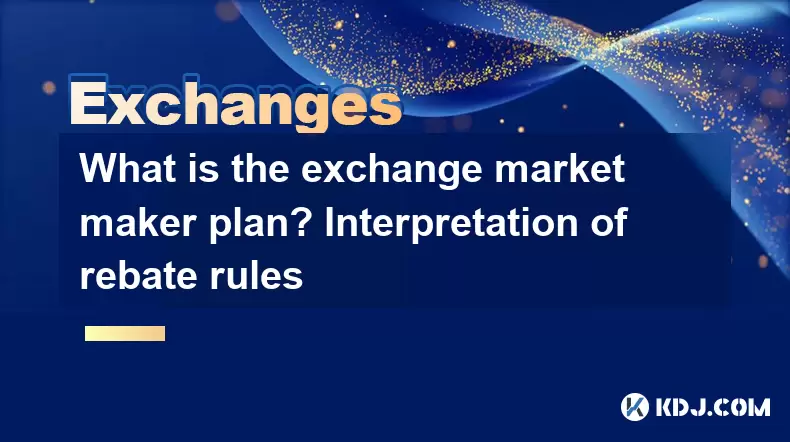
Understanding the Exchange Market Maker Program
The exchange market maker program is a structured initiative designed by cryptocurrency exchanges to attract professional traders or firms that provide liquidity to the platform. These participants, known as market makers, play a crucial role in ensuring that trading pairs have sufficient depth and narrow bid-ask spreads. In return for their services, exchanges offer various incentives, including fee rebates, reduced trading costs, and sometimes even direct payments.
A key objective of such programs is to enhance the overall trading experience for users by improving order book liquidity. This encourages more retail and institutional traders to use the exchange, thereby increasing trading volume and platform credibility.
Role of Market Makers in Cryptocurrency Exchanges
Market makers operate by placing both buy and sell orders simultaneously on the order book. Their presence ensures that traders can execute transactions quickly without significant slippage. The market maker's primary function is not necessarily to profit from directional price movements but rather to benefit from the spread between buying and selling prices.
In the crypto space, where volatility is high and liquidity can be uneven across different assets, market makers are essential for maintaining stable and efficient markets. They often use algorithmic strategies to manage risk while continuously providing quotes within tight spreads.
Structure of the Rebate Rules in Market Maker Programs
Rebate rules are at the core of any market maker program. These rules define how much compensation a market maker receives based on their contribution to liquidity provision. Typically, exchanges categorize participants into tiers based on the volume they contribute or the quality of liquidity they provide.
Some platforms offer maker-taker rebate models, where market makers (those placing limit orders) receive rebates, while takers (those executing against existing orders) pay fees. However, dedicated market maker programs often go beyond this standard model and introduce customized rebate structures tailored to high-volume contributors.
How to Qualify for a Market Maker Program
To join a formal market maker program, applicants must usually meet specific criteria set by the exchange:
- Demonstrate proven experience in market making or algorithmic trading
- Provide historical data showing consistent liquidity provision
- Submit a formal application outlining trading strategy and risk management practices
- Meet minimum capital requirements or deposit thresholds
Once accepted, participants may be required to maintain certain performance metrics, such as minimum quote width, frequency of updates, or uptime percentage. Failure to meet these standards might result in reduced rebates or removal from the program.
Exchanges often conduct interviews or technical assessments to ensure that applicants have robust systems capable of sustaining market-making activities over time.
Detailed Breakdown of Fee Rebate Mechanisms
Fee rebates under market maker programs are typically calculated based on several factors:
- Trading Volume: Higher volumes generally lead to higher rebate percentages.
- Quote Quality: Exchanges evaluate metrics like order book depth, spread tightness, and responsiveness to market changes.
- Uptime: Consistent participation in the market increases eligibility for premium rebates.
- Order Type Contribution: Some exchanges differentiate between types of limit orders and reward those that contribute more effectively to liquidity.
These rebates can be paid out daily, weekly, or monthly, depending on the exchange’s policy. Payments are usually made in the native token of the platform or in fiat/crypto of choice, subject to conversion rates and withdrawal conditions.
It is also common for exchanges to impose caps or tiered limits to prevent abuse of the system. Therefore, it is crucial for market makers to thoroughly understand the rebate calculation methodology before committing resources.
Operational Considerations for Market Makers
Participating in a market maker program involves more than just understanding rebate rules. Traders or firms must also consider:
- Infrastructure Requirements: High-frequency trading setups often require colocated servers and low-latency connections.
- API Access: Most exchanges provide dedicated API endpoints for market makers to facilitate rapid order placement and monitoring.
- Risk Management Tools: Automated strategies need safeguards against sudden market moves, exchange downtime, or software glitches.
- Regulatory Compliance: Depending on jurisdiction, market makers may need to comply with local financial regulations, especially when dealing with institutional clients.
Failure to address these aspects can lead to suboptimal performance or unexpected losses despite favorable rebate structures.
Frequently Asked Questions
Q: Can individual traders apply for a market maker program?
Yes, although most programs are geared toward experienced traders or firms, some exchanges allow qualified individuals to participate if they meet the necessary requirements.
Q: Are rebate earnings taxable?
Tax treatment varies by country. Participants should consult with a tax professional to understand obligations related to income generated through market making activities.
Q: Do all exchanges offer the same type of rebate structure?
No, rebate structures differ significantly between exchanges. Some base rebates solely on trading volume, while others incorporate qualitative metrics like order book contribution.
Q: Is there a risk of getting disqualified from a market maker program?
Yes, failure to meet the program’s performance standards—such as minimum uptime or quote quality—can lead to disqualification or reduction in rebate percentages.
Disclaimer:info@kdj.com
The information provided is not trading advice. kdj.com does not assume any responsibility for any investments made based on the information provided in this article. Cryptocurrencies are highly volatile and it is highly recommended that you invest with caution after thorough research!
If you believe that the content used on this website infringes your copyright, please contact us immediately (info@kdj.com) and we will delete it promptly.
- Bitcoin, Fed Rate Cut, and Crypto Stocks: A New Yorker's Take
- 2025-08-05 14:50:12
- Police, Cryptocurrency, Bitcoin Windfall: Unexpected Gains and Cautionary Tales
- 2025-08-05 15:30:12
- MAGACOIN: The Next Shiba Inu ROI? A Crypto Presale Deep Dive
- 2025-08-05 15:30:12
- Bitcoin, Kiyosaki, and the August Curse: Will History Repeat?
- 2025-08-05 14:50:12
- Crypto Airdrops: Your August 2025 Guide to Free Tokens & Opportunities
- 2025-08-05 13:45:13
- Luxury Dining Reimagined: St. Regis Singapore & Marriott's Culinary Celebration
- 2025-08-05 13:45:13
Related knowledge
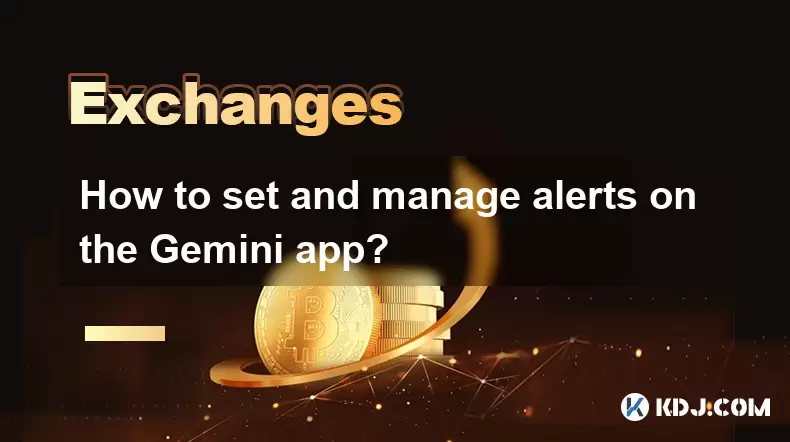
How to set and manage alerts on the Gemini app?
Aug 03,2025 at 11:00am
Understanding the Gemini App Alert SystemThe Gemini app offers users a powerful way to stay informed about their cryptocurrency holdings, price moveme...
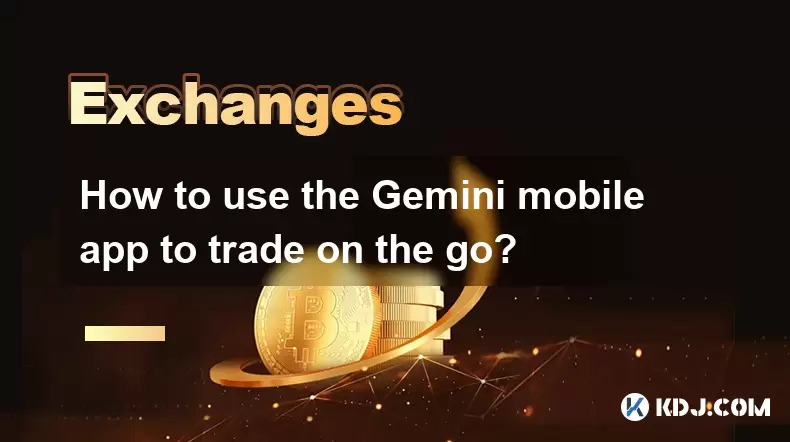
How to use the Gemini mobile app to trade on the go?
Aug 04,2025 at 09:14am
Setting Up the Gemini Mobile AppTo begin trading on the go using the Gemini mobile app, the first step is installing the application on your smartphon...
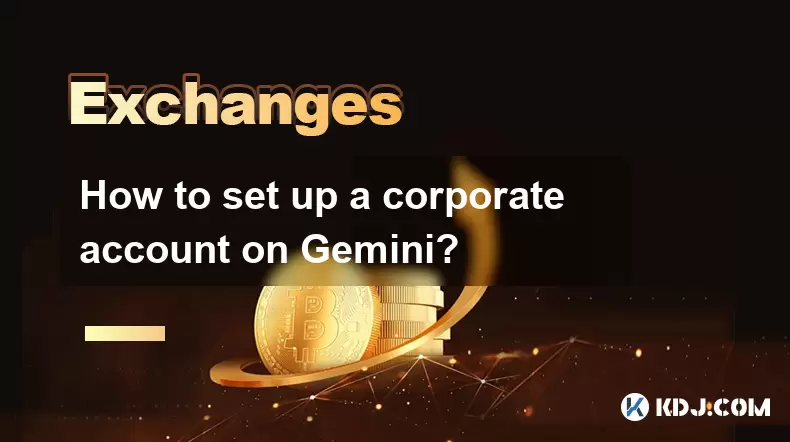
How to set up a corporate account on Gemini?
Aug 05,2025 at 03:29pm
Understanding Gemini Corporate AccountsGemini is a regulated cryptocurrency exchange platform that supports both individual and corporate account crea...
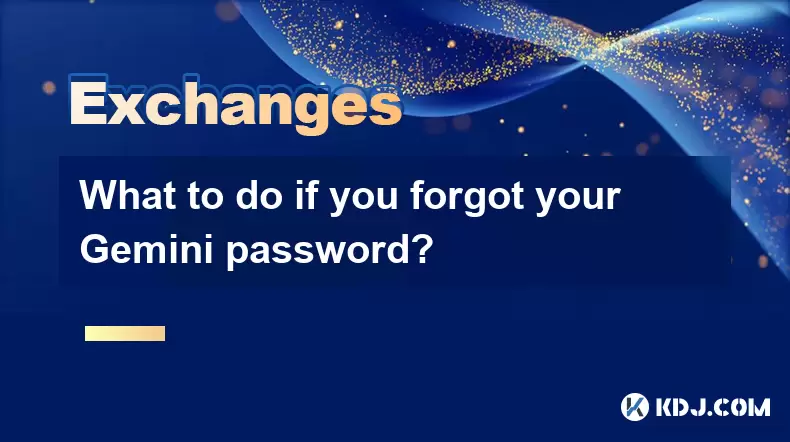
What to do if you forgot your Gemini password?
Aug 04,2025 at 03:42am
Understanding the Role of Passwords in Gemini AccountsWhen using Gemini, a regulated cryptocurrency exchange platform, your password serves as one of ...
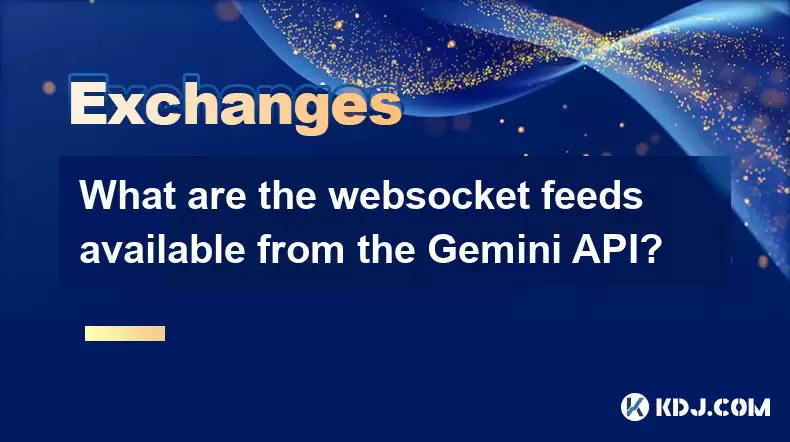
What are the websocket feeds available from the Gemini API?
Aug 03,2025 at 07:43pm
Overview of Gemini WebSocket FeedsThe Gemini API provides real-time market data through its WebSocket feeds, enabling developers and traders to receiv...
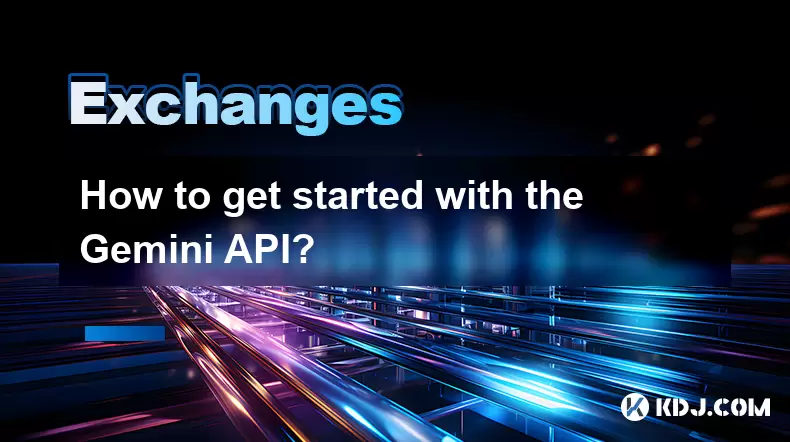
How to get started with the Gemini API?
Aug 05,2025 at 12:35pm
Understanding the Gemini API and Its PurposeThe Gemini API is a powerful interface provided by the cryptocurrency exchange Gemini, enabling developers...

How to set and manage alerts on the Gemini app?
Aug 03,2025 at 11:00am
Understanding the Gemini App Alert SystemThe Gemini app offers users a powerful way to stay informed about their cryptocurrency holdings, price moveme...

How to use the Gemini mobile app to trade on the go?
Aug 04,2025 at 09:14am
Setting Up the Gemini Mobile AppTo begin trading on the go using the Gemini mobile app, the first step is installing the application on your smartphon...

How to set up a corporate account on Gemini?
Aug 05,2025 at 03:29pm
Understanding Gemini Corporate AccountsGemini is a regulated cryptocurrency exchange platform that supports both individual and corporate account crea...

What to do if you forgot your Gemini password?
Aug 04,2025 at 03:42am
Understanding the Role of Passwords in Gemini AccountsWhen using Gemini, a regulated cryptocurrency exchange platform, your password serves as one of ...

What are the websocket feeds available from the Gemini API?
Aug 03,2025 at 07:43pm
Overview of Gemini WebSocket FeedsThe Gemini API provides real-time market data through its WebSocket feeds, enabling developers and traders to receiv...

How to get started with the Gemini API?
Aug 05,2025 at 12:35pm
Understanding the Gemini API and Its PurposeThe Gemini API is a powerful interface provided by the cryptocurrency exchange Gemini, enabling developers...
See all articles

























































































